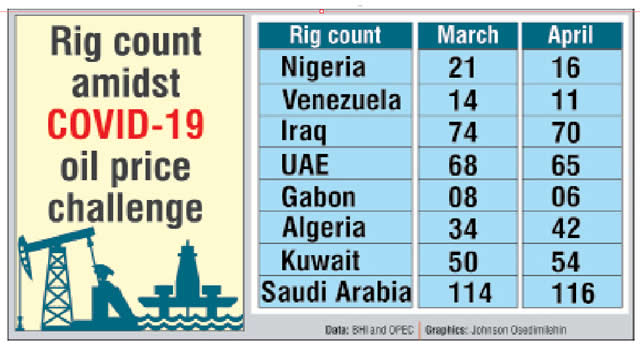Nigeria’s active oil rigs fall by 24% to 16
 The number of active oil rigs in the country fell by 23.8 per cent to 16 in April amid the coronavirus-induced collapse in prices and demand for crude.
The number of active oil rigs in the country fell by 23.8 per cent to 16 in April amid the coronavirus-induced collapse in prices and demand for crude.
Data obtained from Baker Hughes Incorporated and the Organisation of Petroleum Exporting Countries on Tuesday showed that Nigeria’s rig count stood at 21 in March.
The country recorded the second biggest decline in the number of rigs among its peers in OPEC in April, after Venezuela, whose rig count plunged by 11 to 14.
Rig count in Iraq dropped by four to 70; fell by three in United Arab Emirates to 65; and dipped by two in Gabon to six. But Algeria’s rigs rose by eight to 42, while those of Kuwait and Saudi Arabia rose by four and two to 54 and 116 respectively.
Rig count is largely a reflection of the level of exploration, development and production activities occurring in the oil and gas sector.
The slump in oil prices caused by the coronavirus pandemic has forced many companies, including international oil companies, operating in the Nigerian oil industry to slash their capital budgets and suspend some projects.
The Chief Executive Officer of International Energy Services Limited, Dr Diran Fawibe, said, “The oil service sector will be badly affected because if these projects are suspended or cancelled, there is no way the oil companies will make use of service companies.
“Already, there are some projects being undertaken by international oil companies that had been suspended.”
The President, Nigerian Association of Petroleum Explorationists, Mr Alex Tarka, told our correspondent recently that rates for oil rigs were already being renegotiated downwards.
Tarka had said, “Our members are feeling the impact because quite a reasonable number of them depend on these drilling operations to sustain their businesses.
“When you take out exploration, a reasonable number of our members will be impacted.”
One of the major independent firms, Seplat Petroleum Development Company Plc, said in March that it was looking to cut costs by at least 30 per cent to counter a crash in crude prices.
Its Chief Financial Officer, Roger Brown, said the company’s cuts, ideally higher in the short term, would see its drilling plans reduced to three wells from the 15-20 it had planned.
The Chief Executive Officer, Eroton Exploration & Production Company, Mr Ebiaho Emafo, said in April that the firm had suspended a planned $1.5bn, 50-well campaign to more than double output to 100,000 barrels per day by 2021.
Royal Dutch Shell, on the other hand, had said it would reduce capital spending to $20bn for 2020 from its previously planned $25bn, while ExxonMobil cut its budget by $10bn to $23bn.
Total said in March that it would cut its capital spending by around 20 per cent to below $15bn, while Eni said it would reduce its 2020 capital expenditures by €2bn, or 25 per cent.







